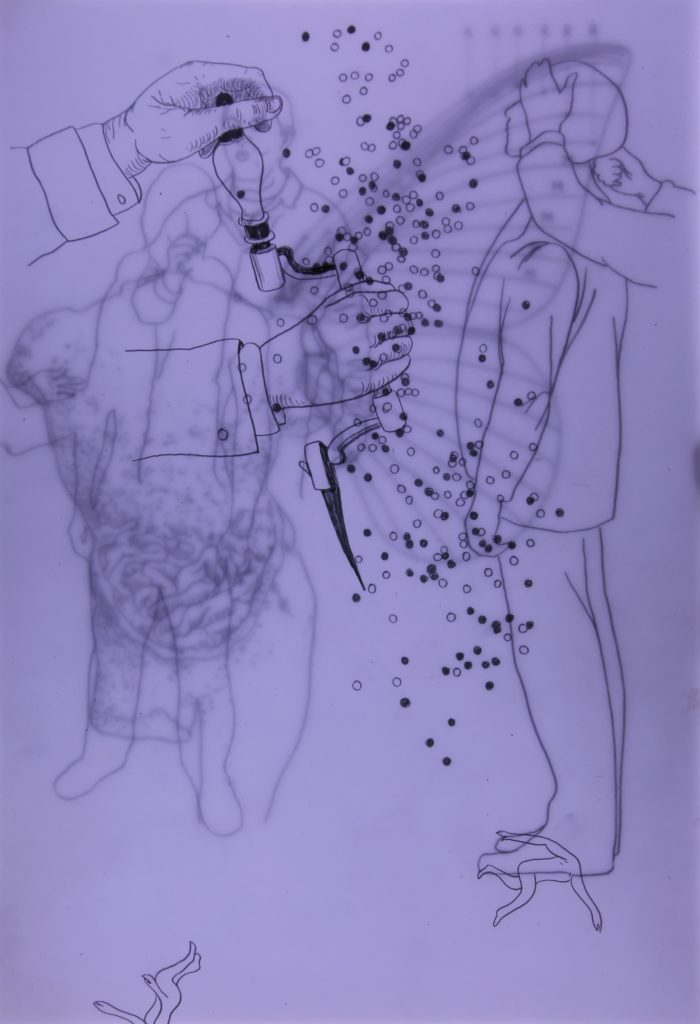On the difficulties of continuing being a translator, and why we persist

June 28, 2023
This essay is part of Transpacific Literary Project’s monthly column, with art by Mit Jai Inn.
After the publication of my English translation of Baek Sehee’s I Want to Die but I Want to Eat Tteokbokki, a memoir about therapy, many reviewers have commented that it is an unusual book because it deals with mental health, that surely this is an outlier in a cultural backwater like Korea where “mental illness is taboo.” This condescending reaction says more about these reviewers’ prejudices and ignorance of contemporary Korea than it does about Baek Sehee’s book, which is a formidable feat of courage and vulnerability, to be sure, but hardly the first time a Korean writer has talked about depression. The “healing,” “well-being,” and “work-life balance” discourses were in full swing in Korea when the book came out, and even (especially?) now it seems like every time I go to a bookstore in Korea there’s a new bestseller on self-care or psychology or life management, and it’s clearly a thriving genre.
So we here, in Korea, are not in need of any Western saviors to come to our rescue. If anything, the publication of this book from Korean to English, years after its translation into several Asian languages including Indonesian, Thai, Vietnamese, and Japanese, marks a rare occasion in which the Western reader is encouraged to listen to what Asian people are interested in when it comes to self-care and mental health, for a change. That’s the real story here: it’s that the advice this time is going in the other direction. That’s what makes the existence of this book, and its bestseller status in multiple countries, so extraordinary. The West is always ready to read trauma porn from Asia. But trauma healing? No way.
And yet, here we are.
What does it mean to be translated into English, and who gets to choose what gets translated?
One of the things I repeatedly remind the Korean publishers with whom I have to wrangle with over translation rights is that being translated into English isn’t like being translated into French or German or Japanese. The translation landscape in English is so bleak, with so few translations being published, especially from languages that are not French, Italian, German, or Spanish, that it’s a miracle that Korean books get translated into English at all. During the Korean part of my press tour for the International Booker Prize shortlist last year, I repeatedly surprised reporters by shooting down their assumptions and assertions that translated Korean literature was having a moment, that the Korean wave had finally entered the literary world. Ten books per year, give or take a few, does not a Korean wave make. Getting Anglophone publishing to buy a Korean book is still like trying to draw blood from stone.
Why is that? There are many reasons, but for one thing, Anglosphere editors don’t tend to read Korean. You’ll find quite a few editors who can read a book in French, Italian, German, or Spanish—let’s pretend to be economists and call them FIGS languages—but an Anglosphere editor who reads Korean is a rarity (they do exist however, and when I meet one in the wild, I want to throw myself at their feet and sob). Sure, these editors can hire outside readers to assess potential translation book projects, and I’ve been that outside reader many times myself, but I always go back to the buying-a-car analogy when it comes to editors acquiring Korean translations: Let’s say you’re in the market to buy a car. Would you buy the car you can test drive, or would you buy the car you can’t?
I’m the dealer who’s trying to sell editors a car they can’t test drive. Not only that, I have to convince them to buy my car over the thousands of other cars that they can test drive.
Every English sale is a miracle—so why do it? Why go through the anxiety, the repeated humiliation, and the meagerness of it all? Well, for the translator, maybe we just like pain. For the author and Korean publisher (rights holder) though, an English sale means it’s a gateway into sales in other territories. Because an English sale is so rare, once a sale is made in the Anglosphere, every other territory sits up and takes notice. And these territories add up. Let’s say you sold your book to a British independent press for $10,000. An American edition might buy it for $30,000. Then France, Belgium, the Netherlands, Germany, Italy, and Taiwan follow suit at varying prices, breaking $100,000 in rights sales at a single visit to the Frankfurt Book Fair. Because what do editors in all those countries have in common? They read English. And that’s just one reason why translation into English matters. One hundred thousand dollars can mean whether a writer keeps writing or learns to code. And the English language is, for better or for worse, the best gateway into the rest of the world.
The second question of who gets to choose what gets translated is even more complex. Quite often, a translator has no choice; either you translate what someone else gives you or you can’t pay your electricity bill. People call me an “established” translator now, but what does that even mean? Similar to when I was still an “emerging” translator, I still don’t know if I’ll be doing this job next year because nothing has been signed yet that will take me that far into the future. The difference between an emerging translator and an established one is that maybe the latter might make a few more bucks off a GoFundMe thanks to the “name recognition.” But quite often, translators have to take what they can get.
There is still, however, some wiggle room for many of us. Maybe you’re a funded grad student and you found a great book during your studies and want to see if any publisher is interested in you translating it. Maybe your spouse can afford to support you while you pursue the precarious waters of literary publishing. Maybe you’ve managed to have done some good work in the past few years and people are finally acknowledging you for it and nominating you for awards and giving you jobs, like judging prizes or teaching workshops. Your wiggle room may vary. But when you have some, seize it.
Since the very beginning of my literary translation career, I had a mission: to showcase Korean literature as progressive, edgy, and highly entertaining, and to enable other readers to experience what I’ve been able to as a reader of Korean literature. It mattered to me that people would know Korean literature was full of queers, non-men, and science fiction. Old white male translators kept putting out translations of Yi Munyol and whatnot; my first publication, Jeon Sam-hye’s “Genesis” for Words Without Borders, was a science fiction story about a young queer woman written by an enby writer. I won Bora Chung, a speculative fiction writer, a PEN/Heim grant and a Booker shortlisting. I got Sang Young Park, my favorite author of Korean queer literature, a Booker longlisting and international recognition when I sold his novel Love in the Big City to an English publisher even before the Korean edition was published. In interviews and in my public presence, I would joke that my mission was to change the face of Korean literature in translation, a completely hyperbolic proposition I would say just to sell a few more books, but frighteningly enough, people started taking the joke seriously.
Which brings us to Baek Sehee’s redoubtable therapy memoir, I Want to Die but I Want to Eat Tteokbokki. This book was one of the rarer instances when I was simply given a book to translate by an Anglosphere editor, the wonderful Emma Herdman at Bloomsbury UK. I knew of the book, of course, and RM of BTS had already made it an international bestseller when it showed up in one of his social media posts. When the English edition was announced, the loveliest messages came pouring in from ARMY, or the global BTS fanbase, saying they were eager to read the book. ARMY from all over the world, of all ages and religious persuasions and sexualities and races, embracing what is a very cosmopolitan and yet beautifully Korean work of art—you bet it wasn’t a surprise for them that Korea produced an international mental health bestseller.
I mention BTS here because they’re the real precursor to I Want to Die But I Want to Eat Tteokbokki doing as well as it’s doing in the Anglosphere. When I was growing up, no one took Korean pop seriously in the West, and Korean culture was just a series of racist punchlines in Gilmore Girls. And while Korean music was making some headway into the West, nothing compares to the explosive popularity of BTS. You have to understand: they destroyed the bamboo ceiling in their field and showed every working Korean artist what was possible and how far we can go. Also, they took breaks and modeled proper self-care for their fans and other artists, showing there’s nothing taboo about discussing mental health! RM in particular loves to read and visit art galleries and museums and will make time to do both! Now that’s disruption. That’s truly changing the face of Korean culture. And that, dear reader, is why we do it.



